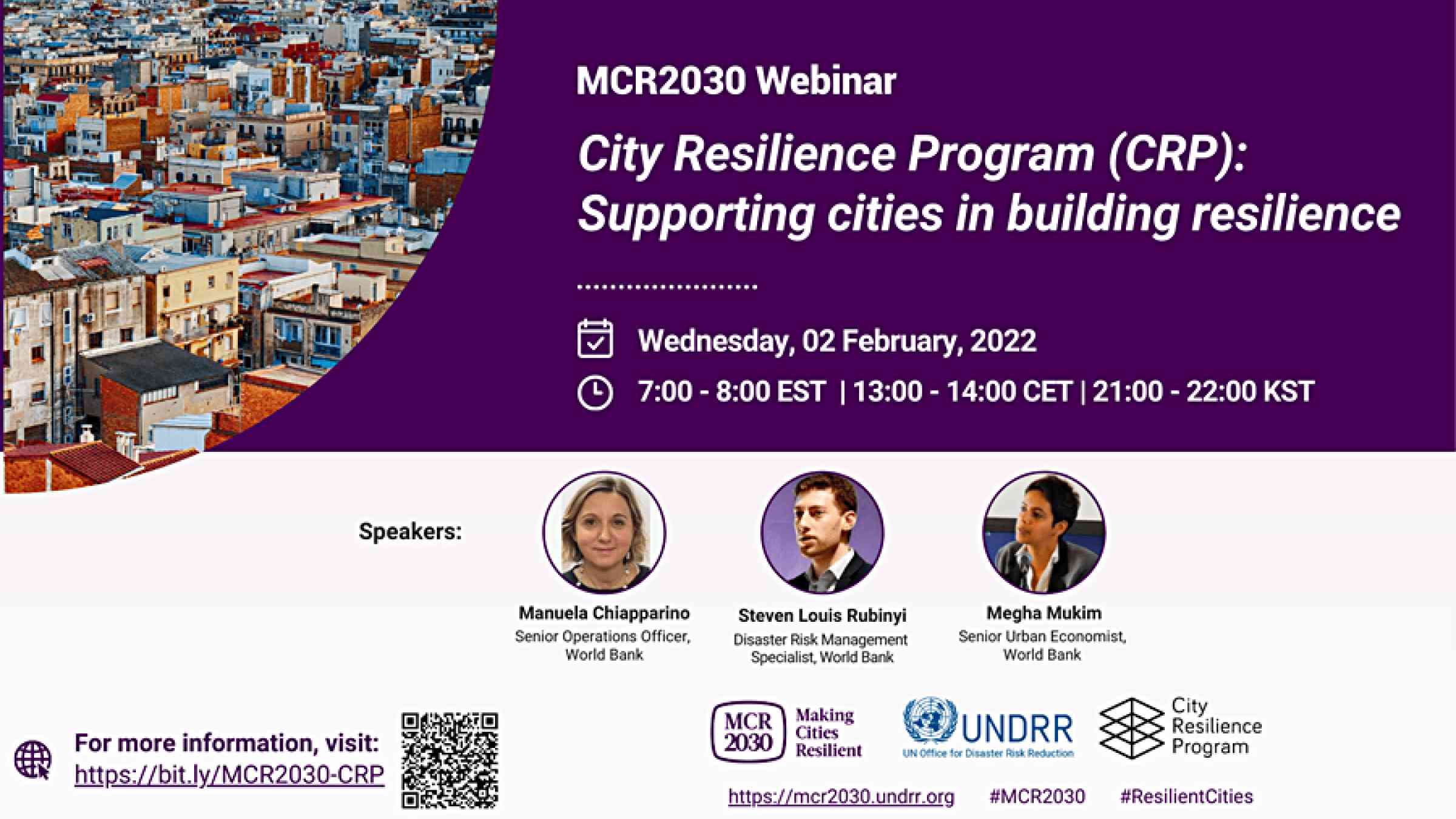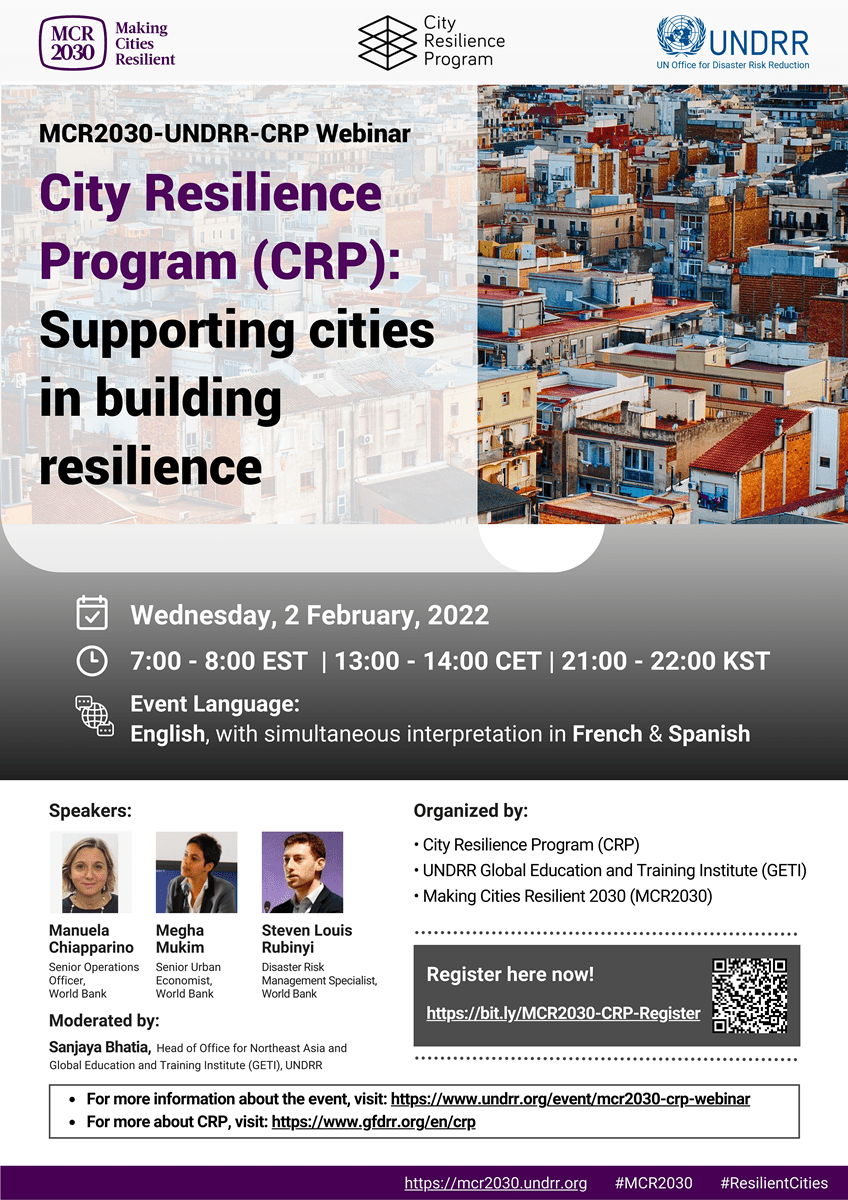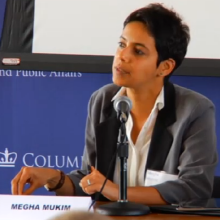[MCR2030-UNDRR-CRP] City Resilience Program : Supporting cities in building resilience

- English

Webinar Recording:
Event Description
The City Resilience Program (CRP) is a partnership between the World Bank and GFDRR. Launched in June 2017, the City Resilience Program (CRP) aims to help cities in low and middle-income countries strategize, plan and prepare climate mitigation and adaptation projects. The aim of the program is to catalyze a shift toward longer term, more comprehensive multi-disciplinary packages of technical and financial services, building the pipeline for viable projects at the city level that, in turn, build resilience.
This session of the Making Cities Resilient 2030 (MCR2030) webinar aims to provide in-depth information to help cities, local authorities, and their partners understand better what the City Resilience Program is and how to access its support. It will include the information on the type of support provided, the eligibility criteria and relevant application process. It will also highlight some examples of the types of successful projects and key components of what makes these applications successful.
Cities shall be equipped with necessary information should they be interested to apply for the City Resilience Program support.
More information about CRP on MCR2030 dashboard: https://mcr2030dashboard.undrr.org/directory/service/46
Event Objectives
- To build awareness among city stakeholders on City Resilience Program (CRP) services.
- To help city stakeholders match their priorities with concessional financing and technical assistance support.
Key questions
- What is the City Resilience Program (CRP)?
- What are the three work streams of the CRP?
- How can cities best access resilience-focused support from CRP?
- How can cities adapt CRP support to their own resilience needs ?
- What is the added value of CRP services to beneficiary cities?
Speakers
CRP representative panelists:

Manuela Chiapparino, Senior Operations Officer, World Bank
Manuela Chiapparino, Senior Operations Officer, is a Senior Operations Officer at GFDRR based in Paris, France. She leads and manages GFDRR’s relations with European bilateral donors. Since 2020 Manuela also co-leads the City Resilience Program (CRP) where she coordinates the Partnership for Resilience Pillar as well as CRP’s strategy, fundraising plans and communication. Before that, Manuela led for many years GFDRR’s engagement with the European Institutions in Brussels, where she managed several EU-funded Programs including the ACP-EU Natural Disaster Risk Reduction Program, a flagship within GFDRR for many years. Manuela joined the World Bank in 2000 and prior to joining GFDRR, she worked for the World Bank’s Middle East and North Africa Region, and the External Affairs Vice-Presidency in Brussels.

Steven Louis Rubinyi, Disaster Risk Management Specialist, World Bank
Steven Rubinyi is a Disaster Risk Management Specialist at GFDRR, where he leads the delivery of the City Resilience Program’s resilience planning advisory services to teams across the World Bank Group. Steven also leads the World Bank’s City Creditworthiness Initiative, which addresses cities’ systemic constraints to borrowing, and works at a thematic level on communities of practice aimed at leveraging geospatial solutions across the World Bank investment portfolio and bringing innovative financing solutions to cities. Before joining the City Resilience Program team, Steven was based in South Asia where he worked on World Bank investment project operations focused on climate adaptation, urban resilience, and housing reconstruction from the 2015 Nepal Earthquake.
City representative Panelist:

Megha Mukim, Senior Urban Economist, World Bank
Megha Mukim is a senior urban economist, team lead for Competitive Cities, and author of the flagship report “Competitive Cities for Jobs and Growth” at the World Bank Group. She works on issues of urban development and competitiveness, and has experience working in high and middle-income (Malaysia, Mauritius, South Africa, China), low-income (Ethiopia, Kenya, India, Philippines, Rwanda Tanzania), and fragile and conflict-affected (Burundi, South Sudan, Sudan) countries. She has several years of research and professional experience in the field of trade, economic geography, industrial development, and poverty. She has taught topics in development at the School of Advanced International Studies in Washington D.C., and at Columbia University in New York.
Moderator:
- Sanjaya Bhatia, Head of Office for Northeast Asia and Global Education and Training Institute (GETI), UNDRR
Date & Time
Date: 2 February 2022 (Wed)
Time: 7:00 - 8:00 EST | 13:00 - 14:00 CET | 21:00 - 22:00 KST
Duration: 1 hour
Language: English with simultaneous interpretation in French & Spanish
Organizers
- City Resilience Program (CRP)
- UNDRR Global Education and Training Institute (GETI)
- Making Cities Resilient 2030 (MCR2030)
About the City Resiliene Programme (CRP)
The City Resilience Program (CRP) is a partnership between the World Bank and GFDRR. Launched in June 2017 as a multi-donor initiative aimed at increasing financing for urban resilience, the Program is supported by the Swiss State Secretariat for Economic Affairs (SECO) and the Austrian Federal Ministry of Finance. CRP’s vision is resilient cities with the capacity to plan for and mitigate adverse impacts of disasters and climate change, thus enabling them to save lives, reduce losses, and unlock economic and social potential. The aim of the program is to catalyze a shift toward longer term, more comprehensive multi-disciplinary packages of technical and financial services, building the pipeline for viable projects at the city level that, in turn, build resilience.
CRP pursues three strategic objectives to move toward this vision: Cities have increased access to tools and technical support to effectively plan for resilience. Cities have increased access to multiple sources of financing to ensure that more investment in resilience come to fruition. Cities can leverage global partnerships to support their resilience objectives.
CRP supports cities across three main thematic areas: Planning for Resilience focuses on providing technical support to ensure that capital investment plans are risk informed. Finance for Resilience zeros in on capital mobilization around urban resilience. Partnership for Resilience concentrates on advocacy and convening global expertise. Together, these three thematic areas are key to helping cities address the resilience challenges of the future.
For more information: https://www.gfdrr.org/en/crp
More information about CRP on MCR2030 dashboard: https://mcr2030dashboard.undrr.org/directory/service/46
About the UNDRR Global Education and Training Institute (UNDRR GETI)
UNDRR GETI was established in 2010 to develop a new cadre of professionals in disaster risk reduction and climate change adaptation to build disaster resilient societies. GETI has a global mandate to provide capacity building support to mainstream disaster risk reduction and climate change adaptation into sustainable development; convene and support inter-city learning to strengthen resilience (Making Cities Resilient); and to provide capacity building and best practice sharing support to national training institutions working on resilience issues. Based in Incheon, the Republic of Korea, UNDRR GETI is also the global secretariat of the Making Cities Resilient 2030 (MCR2030).
About the Making Cities Resilient 2030 (MCR2030)
Making Cities Resilient 2030 (MCR2030) is a unique cross-stakeholder initiative for improving local resilience through advocacy, sharing knowledge and experiences, establishing mutually reinforcing city-to-city learning networks, injecting technical expertise, connecting multiple layers of government and building partnerships.
Through delivering a clear 3-stage roadmap to urban resilience, providing tools, access to knowledge, monitoring and reporting tools. MCR2030 will support cities on their journey to reduce risk and build resilience.
MCR2030 aims to ensure cities become inclusive, safe, resilient and sustainable by 2030, contributing directly to the achievement of Sustainable Development Goal 11 (SDG11) “Make cities and human settlements inclusive, safe, resilient and sustainable”, and other global frameworks including the Sendai Framework for Disaster Risk Reduction, the Paris Agreement and the New Urban Agenda.
For more information: https://mcr2030.undrr.org/
For more information:
- MCR2030 Global Secretariat at [email protected]

